
Telehealth Newsletter
Official Newsletter of Tamil Nadu Chapter of Telemedicine Society of India
What is New?
The baton of TN TSI was passed on to Dr. Ikramullah as the new president. We are now close to our annual conference in Goa. Do submit abstracts and make this a unique conference.
This issue has an important article from Dr. Sanjay Sood on the great success of e-Sanjeeveni that has served over 156 million patients free.
Dr. Krishanga’s two articles on AI And ChatGPT provides new insights on use of technology for patient care.
Wish you all happy festivities.
Thank You
Dr. Sunil Shroff
Chief Editor
EC Member, TSI
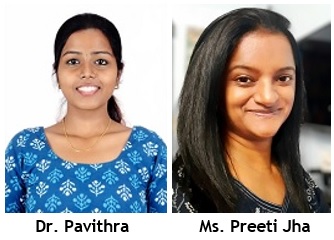
Exploring AI in Healthcare: Telemedicine Society of India (TSI) and MGM Healthcare Collaborate for Insightful Conference
Dr. Pavithra
Assistant Editor, Medindia.net
Ms. Preeti Jha,
Senior Manager, Digital Transformation
Highlights:
MGM Healthcare in Chennai, in partnership with the Telemedicine Society of India (TSI), organized a conference.
It delved into the vital topics of “Role of AI in Healthcare” and “Recent NMC Guidelines on Telemedicine.”
The conference also marked the launch of the innovative MGM Connect App in the healthcare domain.
MGM Healthcare, Chennai, in association with the Telemedicine Society of India (TSI), successfully organized a highly insightful conference focusing on the “Role of AI in Healthcare” and “Recent NMC Guidelines on Telemedicine”. The event also marked the inauguration of the MGM Connect App, a pioneering initiative in the field of healthcare.
The conference began with a warm Welcome Note delivered by Dr. Sunil Shroff, setting the tone for the day’s discussions. Dr. T Senthil, Honorary Secretary of TSI, then introduced the eminent speakers and highlighted the significance of the topics.
AI in Healthcare – Current Status and Potential
Mr. Saurabh Gupta from KIMS Hospitals, Hyderabad, engaged the audience with an enlightening discussion on the current state of AI technology in healthcare. The session underscored the potential benefits and challenges of integrating AI into healthcare systems.
It also highlighted Niramai , a prominent NGO dedicated to revolutionizing breast cancer detection through innovative technology. Their Thermalytix solution utilizes AI-driven thermal imaging to provide non-invasive, early-stage detection, making screenings more accessible and effective. With a mission to save lives through early detection, Niramai is pioneering a new approach to breast health awareness.
The moderator panel, consisting of Dr. Shreevidya from AHEL, Dr. Selvakumar (Chairman, TSI TN Chapter), and Dr. Ikramullah (Vice President, TSI TN Chapter), facilitated a comprehensive discussion.
The session explored key points such as the rationale behind discussing AI in healthcare
Definition and components of Artificial Intelligence
Different types of AI and their applications
Opportunities and challenges in implementing AI in healthcare
Notable AI use cases in the Indian healthcare landscape
Existing obstacles and considerations for adopting AI
A vibrant Question and Answer Session guided by Dr. Masood Ikram provided attendees with a platform to address their queries and seek further clarity on AI in healthcare.
The conference reached another milestone with the Inauguration of the MGM Connect App by Mr. Harish Manian (Group CEO, MGM Healthcare) and Dr. R Kim (President and Elect, TSI). The ceremony was expertly moderated by Mr. D. Satheesh Kumar, Treasurer of TSI TN Chapter.
Panel Discussion: Recent NMC Guidelines for Telemedicine and RMP’s Training
The focus was on the recent NMC guidelines for telemedicine and the necessary training for Registered Medical Practitioners (RMPs).
Under the leadership of Dr. Sunil Shroff (President, TSI TN), Dr. R Kim (President Elect, TSI), Ms. Bagmishika Puhan (Associate Partner, TMT Law Practice, South Delhi), Dr. K Ganpathy (Past President, TSI), and Dr. T Senthil (Hony. Secretary, TSI TN), a comprehensive panel discussion unfolded.
Recent Applications of AI in Healthcare
Dr. Dheeraj Krishna, Head of Telemedicine at Star Health Insurance, introduced the session, paving the way for Ms. Mukta Arora, Founder & CEO of myGleeo. Ms. Arora’s presentation delved into the latest advancements and successful applications of AI in the healthcare industry. She showcased compelling case studies and real-world examples that highlighted the transformative potential of AI.
Moderated by Dr. Sheila John, Dr. Ramakrishnan, and Dr. Thulasi Bai (EC Members – TSI TN), the session provided a platform for in-depth exploration and insightful discussions.
The day concluded with an engaging Question and Answer Session, where Mr. Rajarajan S (COO, MGM Healthcare) led discussions that addressed various queries, concerns, and opinions.
The conference’s essence was captured during the Key Takeaways and Vote of Thanks by Dr. Ananth Pai, Director of Medical Services at MGM Healthcare. His remarks highlighted the knowledge gained and the collaborative spirit that underscored the event.
MGM Healthcare’s conference, in collaboration with TSI, successfully brought together experts, practitioners, and enthusiasts from the healthcare and technology sectors. The event’s focus on AI, telemedicine guidelines, and the inauguration of the MGM Connect App showcased the institution’s commitment to advancing healthcare through innovation and informed discussions.
References :
1. WHO issues first global report on Artificial Intelligence (AI) in health and six guiding principles for its design and use https://www.who.int/news/item/28-06-2021-who-issues-first-global-report-on-ai-in-health-and-six-guiding-principles-for-its-design-and-use
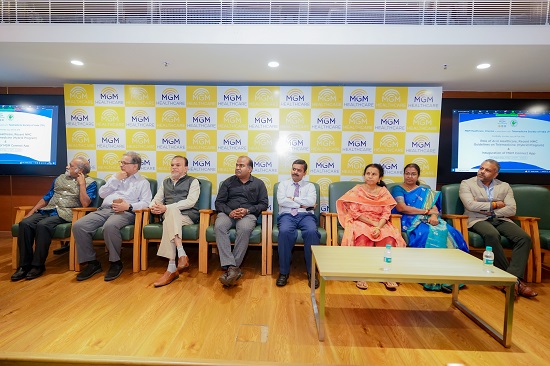
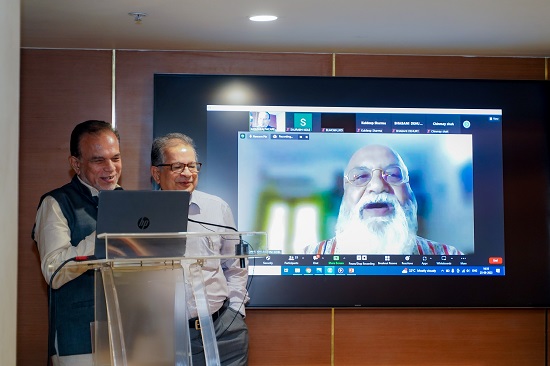
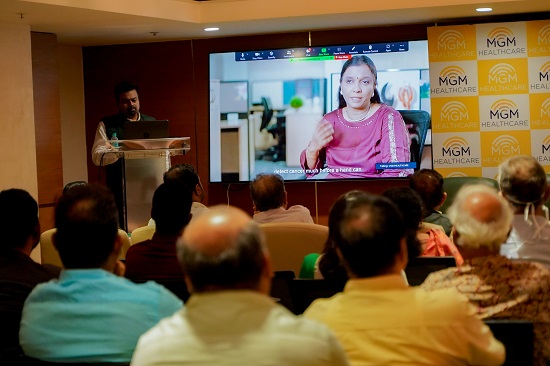
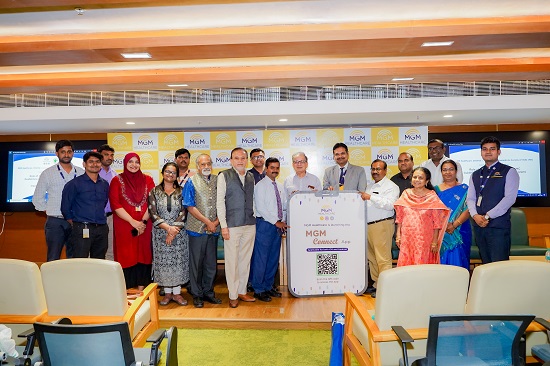
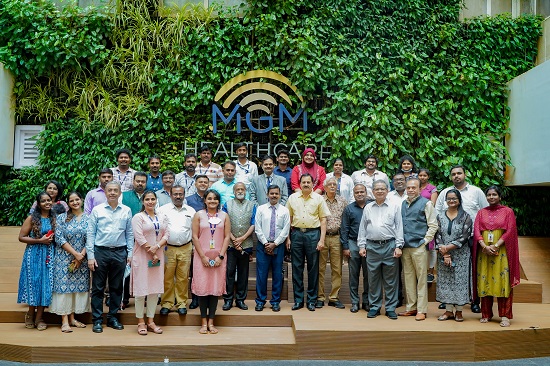
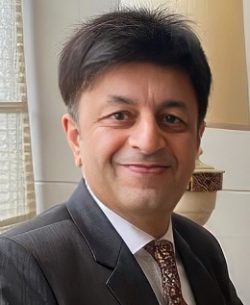
eSanjeevani – National Telemedicine Service of India completes 150 million teleconsultations
Dr. Sanjay Sood
Project Director – eSanjeevani
eSanjeevani is the National Telemedicine Service of Ministry of Health & Family Welfare (MoHFW), Government of India. This state-of-the-art cloud-based telemedicine platform has been indigenously developed, deployed and operationalised by the Centre for Development of Advanced Computing in Mohali.
Owing to its widespread and speedy adoption eSanjeevani has evolved into the world’s largest documented telemedicine implementation in the primary healthcare. eSanjeevani – National Telemedicine Service is testimony to the fact that digital health has come of age in India. eSanjeevani has revolutionised primary healthcare in India by bringing health services to the masses in rural areas and remote communities. This microservices architecture based, population-scale unified telemedicine platform is implemented in two variants:
- eSanjeevaniAB-HWC (a provider-to-provider telemedicine platform): this Hub & Spoke based variant provides assisted teleconsultations for patients who walk into Health and Wellness Centres (HWCs). The Community Health Officers in HWCs facilitate teleconsultations for patients and through eSanjeevani connect them to the doctors and medical specialists in hubs established in secondary/tertiary level health facilities or medical colleges.
- eSanjeevaniOPD (a patient to provider telemedicine platform): it enables citizens to access health services in the confines of their homes through smartphones or laptops etc.
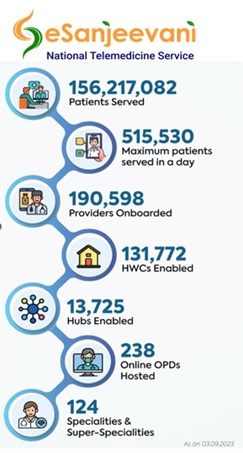

Where Do Humans Stand When It Comes to AI in Healthcare?
Dr. Krishanga Srivastava
Associate Editor, Medindia.net
Highlights:
Recent surveys indicate that concerns about the potential negative impacts of AI in healthcare are on the rise, with a majority of respondents expressing more worry than excitement
There is a significant increase in concerns about AI’s impact on patient data privacy within the healthcare sector, highlighting the need for comprehensive data privacy regulations
It’s crucial for healthcare professionals and the public to engage in discussions, promote transparency, and advocate for measures to ensure responsible AI deployment in healthcare
Is Humanity Leading or Lagging in the Age of AI in Healthcare?
In recent times, discussions surrounding the emergence of generative artificial intelligence (AI) capable of producing convincing text and imagery have likely taken place among healthcare professionals, policymakers, and the public. These conversations have often revolved around the potential benefits and concerns associated with this technology. Recent findings indicate that apprehensions about the potential negative impacts of AI in healthcare are beginning to outweigh the enthusiasm for its positive applications.
A recent survey conducted by the Pew Research Center, involving over 11,000 individuals from the healthcare field and the general public, revealed that a majority of respondents express more worry about artificial intelligence in the context of healthcare than excitement. This shift in sentiment coincides with the growing attention devoted to AI’s role in healthcare and medical practices. When compared to previous surveys, Pew notes a significant increase in the percentage of healthcare professionals and the public who are more concerned than excited about AI, rising from 37 percent in 2021 to 52 percent in the most recent survey. (1)
The Level of Concern and Enthusiasm on Specific Healthcare AI Use Cases
When questioned about the adoption of AI by healthcare providers for patient care, approximately half of the respondents expressed uncertainty, while the remainder were evenly divided between those who believed it would be beneficial and those who perceived potential harm. More individuals held the belief that AI could enhance the quality of healthcare delivery by assisting healthcare professionals in diagnosis and treatment decisions. However, opinions may differ when considering specific applications of medical AI, such as the use of triaging algorithms to make critical decisions about patient treatment allocation.
Notably, the survey identified a substantial increase in concerns about AI’s impact on patient data privacy, particularly within the healthcare sector. This aligns with the calls from healthcare practitioners, policy experts, and researchers for comprehensive data privacy regulations to protect patient rights and ensure accountability for organizations utilizing AI in healthcare. As of now, legislative measures addressing privacy and data protection in healthcare AI remain under consideration.
One aspect not directly addressed in the survey is AI’s potential to exacerbate or mitigate healthcare disparities and biases. Evidence spanning several years has shown that AI systems can either perpetuate or alleviate biases based on factors such as race, gender, or socioeconomic status in healthcare outcomes and treatment decisions. However, AI also has the potential to uncover hidden biases within healthcare systems and practices, offering opportunities for improvement.
These findings from Pew raise crucial questions about how individuals involved in healthcare, as well as those who are not directly engaged in AI development, can maintain a sense of autonomy as AI technology becomes increasingly prevalent and influential in the medical field. It underscores the notion that AI often feels like something happening to healthcare practitioners and patients, rather than a tool they actively shape or influence. This sentiment is particularly pronounced in regions outside of China, Europe, and the US. However, even those actively engaged in addressing ethical and human rights issues related to healthcare AI can sometimes feel powerless or discouraged.
Avenues for Healthcare Professionals and the Public to Exert More Control over AI’s Impact on Healthcare
Scrutinize the intentions of individuals discussing the potential of AI in healthcare, especially in the context of superintelligent and artificial general intelligent systems. Fears about these advanced AI concepts can serve the interests of a small group of influential healthcare organizations and tech companies. Focusing on these hypothetical scenarios may overshadow the importance of addressing present-day healthcare AI challenges.
Promote broad conversations about AI’s role in healthcare across the medical community and within society at large. Relying solely on healthcare industry executives and AI developers for guidance on ethical and practical considerations is akin to seeking advice from biased sources. Engaging in discussions at various levels of healthcare and involving diverse perspectives is crucial.
Recognize that historical predictions about the transformative impact of AI in healthcare may not always be accurate. While concerns about potential job displacement in the healthcare sector have arisen due to AI, widespread unemployment has not materialized. Additionally, regulatory measures have the potential to ensure responsible AI deployment while fostering innovation and job creation within the healthcare industry.
Embrace the understanding that comprehending AI’s role in healthcare is a fundamental aspect of healthcare professionals’ and patients’ roles in the 21st century. Educate oneself about the ethical and practical implications of AI in healthcare, and communicate expectations to elected officials and healthcare organizations. Advocate for measures such as transparent disclosure when AI influences healthcare decisions, the option for patients to opt out of automated decision-making, and regular audits or testing of AI systems used in healthcare settings to ensure fairness, accountability, and patient well-being.
In conclusion, the evolving landscape of AI in healthcare demands ongoing ethical scrutiny, collaboration, and advocacy for responsible deployment and patient well-being.
Reference:
Growing public concern about the role of artificial intelligence in daily life
https://www.pewresearch.org/short-reads/2023/08/28/growing-public-concern-about-the-role-of-artificial-intelligence-in-daily-life/
Source: Attributed to Medindia

What 17 Doctors failed to diagnose, ChatGPT’s AI Diagnosed in Minutes
Dr. Krishanga Srivastava
Associate Editor, Medindia.net
Highlights:
- After three years of unsuccessful attempts to diagnose her four-year-old son’s persistent pain and growth issues, a mother turned to ChatGPT for assistance
- ChatGPT, an artificial intelligence tool, has been increasingly relied upon across various industries for streamlining repetitive tasks and freeing up time for more crucial responsibilities
- By sharing her son’s symptoms with ChatGPT, the mother discovered that he was suffering from tethered cord syndrome, a rare neurological condition
For three years, a mother struggled to identify the source of her four-year-old son’s suffering, as his symptoms persisted despite consultations with 17 doctors. Ultimately, she turned to ChatGPT for answers.
The mother decided to seek assistance from ChatGPT in order to pinpoint a diagnosis for her son. She created an account and provided detailed information about his symptoms. The rise of artificial intelligence, exemplified by the tool ChatGPT, has streamlined repetitive tasks across various industries, freeing up time for more pressing priorities.
Growing Reliance on ChatGPT
This growing reliance on the tool was underscored when a woman sought out ChatGPT to diagnose her four-year-old son, who was experiencing both toothaches and stunted growth. Courtney, the mother of the boy known as Alex, expressed her frustration, explaining, “I have to give him Motrin every day, or he has these gigantic meltdowns. If he had Motrin, he was totally fine.”
During the COVID-19 pandemic, Alex began chewing things that caused him pain, prompting Courtney to seek medical attention. Despite visiting numerous doctors, including an emergency room visit, she remained unable to find a solution to her son’s pain and other symptoms.
After some time, she noticed that Alex’s growth had plateaued and consulted a doctor who speculated it might be a post-COVID-19 complication. “He’d grown a little bit. He would lead with his right foot and just bring his left foot along for the ride,” she recalled.
When 17 Doctors Failed to Diagnose, ChatGPT Came in Handy
After consulting 17 doctors, the breakthrough came from an unexpected source. Courtney decided to turn to ChatGPT for insight into her son’s toothache and stunted growth. By sharing the symptoms with ChatGPT, she learned that Alex was suffering from a rare neurological condition called tethered cord syndrome. She then joined a Facebook group consisting of parents whose children also grappled with the same condition.
“I went line by line of everything that was in his MRI notes and plugged it into ChatGPT. I put the note in there about how he wouldn’t sit crisscross applesauce. To me, that was a huge trigger that a structural thing could be wrong,” she recounted.
Courtney scheduled an appointment with a neurosurgeon, expressing her suspicion that her son might have tethered cord syndrome. The doctor examined the MRI and confirmed Alex’s condition. Subsequently, Alex underwent surgery for the condition a few weeks ago.
This case is not the first in which ChatGPT has played a crucial role in diagnosing a medical condition. In March, a Twitter user shared how the AI tool accurately identified a diagnosis for their pet dog when conventional doctors were unable to do so.
Reference:
ChatGPT in medicine: An overview of its applications, advantages, limitations, future prospects, and ethical considerations
https://pubmed.ncbi.nlm.nih.gov/37215063/
Tethered cord syndrome is a condition where the tissue in the spinal cord forms attachments, limiting the movement of the spinal cord and causing abnormal stretching of body parts, according to the American Association of Neurological Surgeons.
To conclude, ChatGPT’s intervention proved invaluable after a prolonged struggle to diagnose a 4-year-old’s pain. This case highlights the potential of AI in healthcare.
Telemedicine – News from India & Abroad
Google’s AI Tool Detects Genetic Mutations With 90% Accuracy
Google’s AlphaMissense AI tool has taken a groundbreaking step in predicting harmful genetic mutations. It achieved a remarkable 90% accuracy rate in identifying missense….. Readmore
AI Takes Up the Dual Role of Predicting and Relieving Hot Flashes
Scientists at the Institute for Applied Life Sciences (IALS) at the University of Massachusetts Amherst, in partnership with Embr Labs, have devised a machine-learning algorithm……. Readmore
A Healthy Dose of ‘AI Learning’ With CDS Algorithm Tools: A Prescription for Doctors
As artificial intelligence systems like ChatGPT become increasingly integrated into everyday healthcare practices, physicians are expected to incorporate these tools……Reademore
“Ring One” : Changing the Game in Health Tech, One Finger at a Time
Muse Wearables, an Indian technology startup, has unveiled a smart ring featuring advanced health tracking capabilities and convenient “on the go payments.”…… Readmore
TN – TSI invites all the TSI Chapters and Members to submit information on their upcoming Webinar or Events (50 words), News related to Telemedicine (200 words) or short articles (500 words) for the monthly e-newsletter.Guidelines for submission to TN TSI Newsletter-
- Report can be from 500 to 600 words
- Report Should be relevant to Telemedicine or Medical Informatics
- No promotion of self or any product
- Avoid plagiarism
- All references should be included
- Provide any attributions
- Visuals are welcome including video links
- Send full authors name, degrees, affiliations along with a passport sized photograph of good resolution. If multiple authors only main author photo to be sent.
Submission may be sent to – tsigrouptn@gmail.com
Editors reserve the rights for accepting and publishing any submitted material.
Editor in Chief – Dr. Sunil Shroff
Editors – Dr. Senthil Tamilarasan & Dr. Sheila John
Technical Partner- https://www.medindia.net

